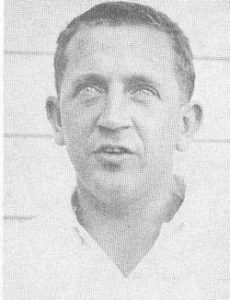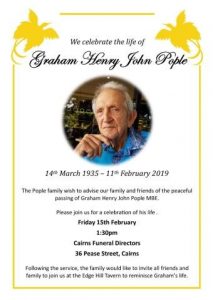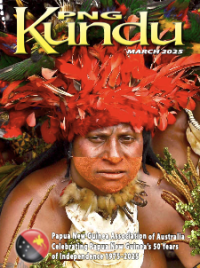Graham Henry John Pople MBE 14 March 1935-11 February 2019
With sadness PNGAA advises that Graham Pople passed away on 11 February 2019, aged 83 years.
The Pople family extend an invitation to Graham’s family and friends to join them in celebrating Graham’s life on Friday 15 February 2019, 1.30pm at Cairns Funeral Directors, 36 Pease Street, Cairns. Following the service the family would like to invite those attending the service to the Edge Hill Tavern to reminisce about Graham’s life.
In 2010 Malum Nalu wrote the following article about Graham’s then unpublished autobiography, The Popleography.
Old time kiap: Graham Pople tells his story
BY MALUM NALU
I’VE had the privilege of browsing through the unpublished autobiography and patrol diaries of Graham Pople, former kiap and Member for Gumine in the first PNG House of Assembly.
Simply titled The Popleography, it gives a fascinating insight into life in the far-off pre-independence days of PNG’s political infancy.
It’s an honest-to-god article by a maverick kiap, reminiscing about the hard yards and seat-of-pants rides washed along by beer in those amazing colonial days.
Pople was elected to the first House along with a motley crew of other MPs including legendary Sepik River crocodile hunter, John Pasquarelli, John Stuntz, Ian Downs, Barry Holloway, Ron Neville, Graham Gilmore, Horrie Niall, John Guise, Paul Lapun, Lepani Watson and Mathias Toliman.
Now 75 and a PNG citizen (he received his papers from Sir John Guise on Independence Day 1975), Pople runs the Weigh In Hotel at Konedobu. He says he put the document together at the behest of his children.
Drop in at the Weigh In any day of the week and chances are you’ll meet Pople at the bar, as animated as in his kiap days. He’ll give you a comprehensive history lesson about PNG.
Born in Armidale, New South Wales on 14 March 1935, in 1956 Pople came across an advertisement for cadet patrol officers to seek a life of adventure in the “dark unknown” – PNG.
He applied, was accepted and, in March 1956, departed on a Qantas DC4 for a land that would become his home.
Pople served in exotic places such as the thriving Daru, from where he patrolled the Western District and ventured across the border into the then Dutch New Guinea, the Western Highlands and the Eastern Highlands (including Chimbu).
Reading The Popleography makes one realise how far PNG has gone backwards, especially with towns like Daru, Minj, Banj and Kainantu now shocking skeletons of their glory days.
Pople writes of Kainantu in the 1960s:
Kainantu was a lovely little town in the early ‘60s and was thriving based many coffee plantations being established in the area and also of gold.
Kainantu had been the centre of gold rushes in the early 1930s and Ted Ubank and Noel Stagg, two prospectors from that era, were still mining in the area.
Ken Rehder also operated a small gold mine at Binamarien as an adjunct to his two small coffee plantations.
The Summer Institute of Linguistics had their PNG headquarters at Ukarumpa, just over the hill from Kainantu – some five miles or so away – which was also where the Aiyura agricultural station was established.
So there was a quite large, for a sub-district office, non-indigenous population in the area.
Kainantu had its own airstrip, and the town had grown up around this feature, with the district office on the northern side and the hospital at the southern western end.
There was a nine-hole golf course with a very well-frequented club house.
A hotel sat on a knoll above the main township.
This was managed by a Dutch couple who were very hospitable.
The Salvation Army were active in the area also.
Out on the road to Okapa they had a block of land on some 200 acres where they were growing potatoes commercially and where they held Bible classes.
In Kainantu itself they had a small station where there were two nursing sisters who assisted in running the hospital, assisting the doctor and the medical assistant.
It was a growing town and there were several commercial businesses in the town itself.
Jan Boij and his brother ton had a service station, which included a trade store and they later built a butcher’s shop there.
I think, from memory, they may also have had a small bakery operating.
Jack Scurrah ran a store on behalf of Buntings, while Dick Miellear also had a store and associated businesses including trucking.
Burns Philp also ran the main store for the township.
The government was well represented with the Native Affairs staff, medical staff, an agricultural officer, one or two education officers, a mechanic, a policeman, a labour officer, a district officer/clerk and probably some others who I have forgotten.
But based on coffee, gold and government services, Kainantu was a bustling and growing township.
The residents proudly called it ‘The Mile-High Gateway to the Highlands’ as its elevation was allegedly 5, 280 feet above sea level.
On the road towards Goroka, the Lutheran Mission had quite a big station, named Raipinka, which they had established in the early 1930s and had developed since.
In those days, the New Guinea side of the country, being a Trust Territory was constantly under the watchful eye of the United Nations, which decided the country should be pushed towards self-government and independence.
To placate the UN, and to evidence that Australia was aware of the need for political evolution, a national election was planned. At the time, Pople was the senior Administration official at Gumine. He was asked by the local people to represent them in parliament and was elected.
He recalls that none of the new Members seemed to know what they were supposed to do or what their powers were.
“The clique of ex patrol officers stuck pretty well together and had some experience. The rank-and-file members looked to this group for guidance,” Pople says.
“But we were all tyros, with the exception of the few that had some experience in the Legislative Assembly, and most of us thought it would prove to be a rewarding experience.
“Unfortunately, the records that I kept of newspaper clippings and other articles in which I featured during the period of my occupancy of the House of Assembly, 1964-68, have been destroyed, and I have nothing to which I can refer except for a very fallible memory.”
Pople believes self-government and independence came too early.
“My own personal view is that the declaration of self-government was early but could have been handled okay if the interval before independence could have been lengthened,” he says.
“More emphasis should have been in the 1960s and 1970s in educating more senior public servants from the national sector.
“They should have been educated at universities and similar institutions overseas to get the necessary exposure to other cultures and people from other countries in similar positions from countries faced with similar development problems.
“But this was not to be and the establishment of the University of PNG in the late 1960s then made it obligatory, from a point of pride, that all training would take place in-country and so our potential leaders, lost that opportunity of exposure to other cultures which could have made a big difference to our development.
“I know that there are many people, mainly academics, who would oppose my point of view, claiming it was more essential to develop a national identity, but these are my personal views for the information of my children.
“Despite the early declaration of independence and the paucity of training for future leaders, PNG has now been independent since 1975, and we are all aware of how the country is faring and has fared.
“But would later independence with the training I suggested have made any difference?
“No one knows and it is impossible to tell, and so it is a useless debate.”
Source: This article is a slightly edited version of one that was originally published in ‘The National’ newspaper and later, in 2010, on https://asopa.typepad.com/asopa_people/2010/06/old-time-kiap-graham-pople-tells-his-story.html






